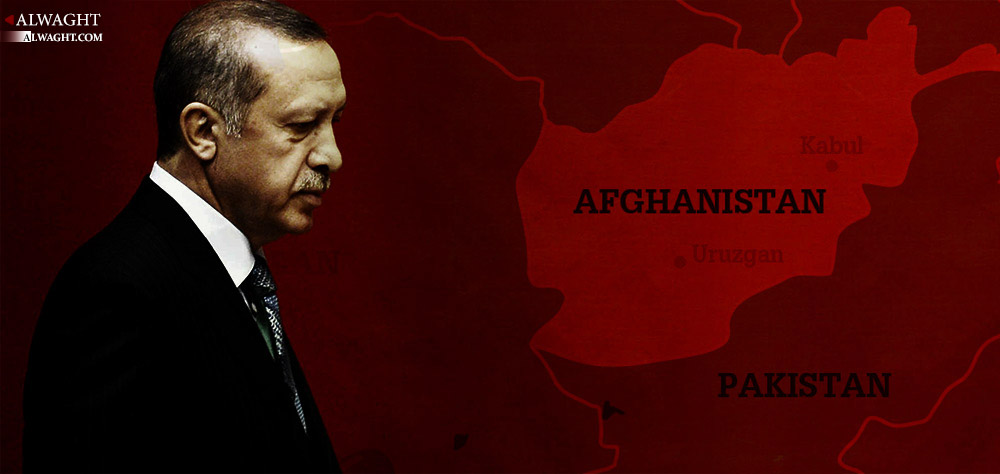Alwaght- Turkish Prime Minister Binali Yildirim visited Afghanistan on Sunday, marking the continuation of his country’s active foreign policy which has begun last year.
Yildirim, heading a high-ranking delegation, met with the Afghan President Ashraf Ghani and Afghanistan national unity government’s Chief Executive Abdullah Abdullah. In a largely symbolic move, the Turkish PM visited a military base of his country’s forces who are serving as part of NATO mission.
What does the Turkish government seek in Afghanistan? Answering this question takes looking back at the past record of relations between Kabul and Ankara. This will help explore the key goals of the visit.
History of Turkish-Afghan ties
The two countries' relationship is considerably based on friendship and closeness. Afghanistan was the second country after the Soviet Union to recognize the Republic of Turkey in 1921. In their writing of the nation’s constitution at the time, the Afghan politicians were inspired by the worldview of Mustafa Kemal Ataturk, the founder of modern Turkey. They also aimed to copy the Turkish model of development in their own country. Their warm relationship went on for decades, until 1979, the year the Soviet Red Army occupied Afghanistan.
A new period of a friendly relationship between Ankara and Kabul started after 2001, the year the country was invaded by the US-led international coalition following 9/11 attacks in the US. Following the occupation of Afghanistan, Ankara sent forces to Afghanistan as part of North Atlantic Treaty Organization (NATO) and International Security Assistance Force (ISAF) military mission. But Turks did not limit their Afghanistan presence to the military mission. They after 2007 proposed an initiative for holding tripartite meetings, gathering together Ankara, Kabul, and Islamabad, with the aim of settling the disputes and bringing peace to the war-torn country.
The Turkish Foreign Minister Mevlut Cavusoglu visited Kabul on June 14, 2016, in a new effort to expand the ties with Afghanistan. Over the course of the past three years, the Turkish role in Afghanistan was played in two forms: official communications with the government, and unofficial, and sometimes even official, contacts with the various political factions in the country. In the past few years, Turkey cultivated close relations with the Taliban militant group as well as the Uzbek ethnic factions, particularly General Abdul Rashid Dostum, who served as vice president until 2014. These channels helped the Turkish government pursue its objective of getting a deep toehold in Afghanistan. With regard to the recent international developments, specifically in West Asia region, the aims of the visit could be explained as follows:
Playing a mediatory role in peace talks
In the past few years, the most challenging home issue the Afghans had been dealing with has been the peace talks with Taliban. The process motivated many regional and international actors to take a role as a mediator between the government and Taliban. Like others, Turkey over past few years has embarked on an effort to make Ankara, or Istanbul, a major location hosting the peace dialogue between the warring sides. In the new period, marked by the US President Donald Trump's unveiling of his new strategy in Afghanistan and eruption of tensions between Ankara and Washington in Syria, Turkish officials appear to have set in motion rejuvenated attempts to influence and direct the Afghan peace process. Turkey, the analysts note, intends to gain weight in the negotiations course to bring to Trump's mind Ankara's power of impacting the Afghan equations for the final aim of forcing him to show flexibility elsewhere. In a joint press conference with Abdullah, Yildirim voiced support for the “important” peace proposal made to Taliban and hoped that the militant group will seize the “historic opportunity” to make peace with the central government. The remarks bear the idea that Ankara zealously seeks a window into the peace process.
Burnishing Ankara face worldwide amid neo-Ottomanism push
Another aim, perhaps the most important one, should be read within Turkey’s new foreign policy approach under President Recep Tayyip Erdogan. Turkey via its new logic, dubbed neo-Ottomanism by the analysts, wishes to take a noticeable role on the global stage. To this end, Ankara leaders follow three strategies: active presence in regional hot spots, actively engaging in mediatory efforts in crisis-hit spots, and improving Turkey’s image in the former territories of the Ottoman Empire with a dream to lead the Muslim world. This policy necessitates active diplomacy across West Asia and North Africa crisis hubs– and elsewhere including Afghanistan. Moreover, the recent Afghanistan trip serves as a political maneuvering instrument to enhance the country’s position internationally.
Boosting cooperation in trade, migration, counterterrorism, and counter-drugs
Economic and security partnership is another area of focus of Yildirim's Afghanistan visit. The PM while in Kabul stated that Afghanistan and Turkey understand each other very well. The supports to Kabul and the cooperation with it will continue strongly. And beside security cooperation, broadening the business ties are high on the agenda. He also told of the joint economic commission's decision to hold a meeting in May, adding that the session will provide a perfect opportunity to discuss wider partnership and mutual investment on a larger scale. The Turkish statesman highlighted the need for the two sides' negotiators to focus on economy, investment, and business. Turkey, moreover, intends to propose mechanisms that will help counter narcotics trade and also excessive migration of the Afghans to Europe through the Turkish soil.
Propagating Muslim Brotherhood Islam against Wahhabi Islam
As a long-term goal, Turkey wants to spread the Muslim Brotherhood version of Islam across the West Asian Sunni Muslim states. What exactly Erdogan of Turkey eyes is the propagation of ideology of his party in these states. The Turkish leader wants to make Muslim Brotherhood thought a mainstream ideology, in opposition to the Saudi-sponsored Wahhabi Islam. So, Yildirim's trip also contributes to Turkish arrangements for a regional contest in which Sunni Muslim world leadership is one of the goals.



























